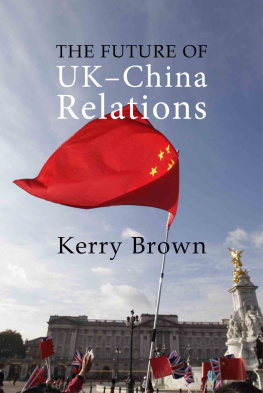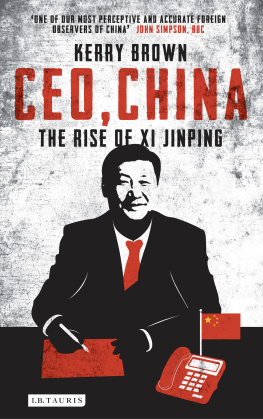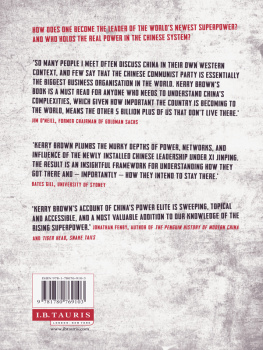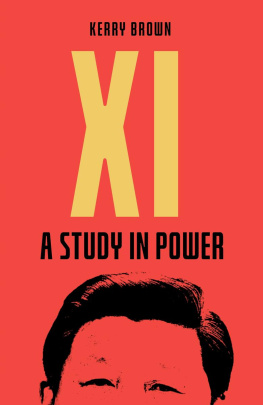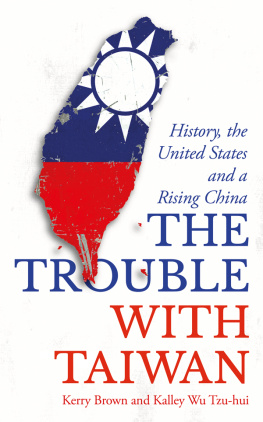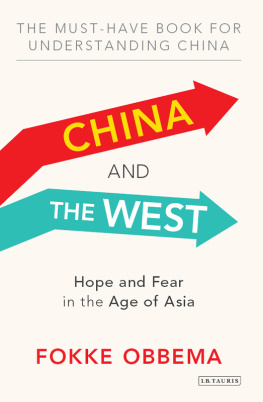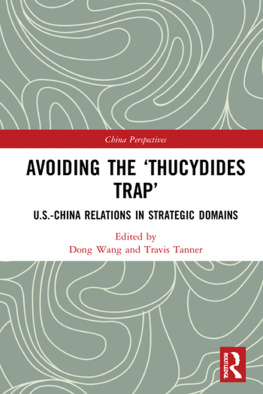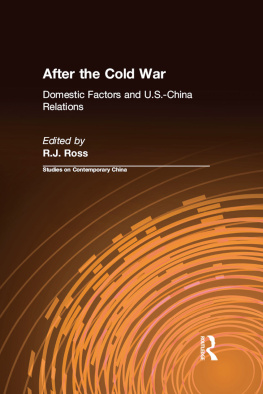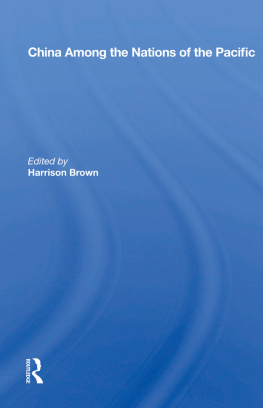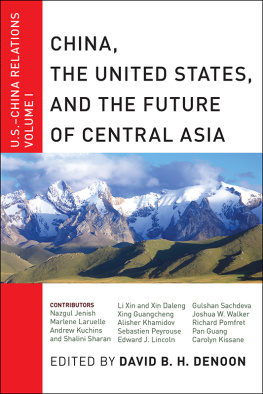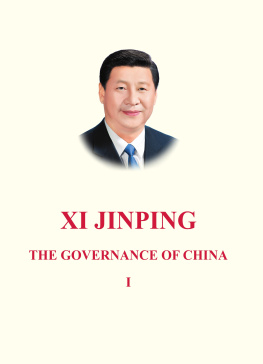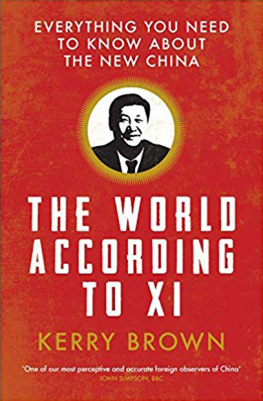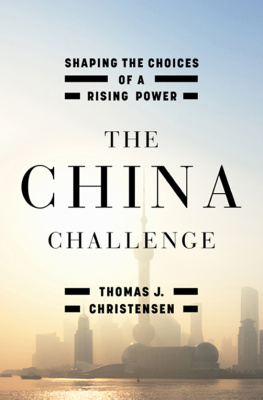Kerry Brown 2019
This book is copyright under the Berne Convention.
No reproduction without permission.
All rights reserved.
First published in 2019 by Agenda Publishing
Agenda Publishing Limited
The Core
Bath Lane
Newcastle Helix
Newcastle upon Tyne
NE4 5TF
www.agendapub.com
ISBN 978-1-78821-156-7 (hardcover)
ISBN 978-1-78821-157-4 (paperback)
British Library Cataloguing-in-Publication Data
A catalogue record for this book is available from the British Library
Typeset by JS Typesetting Ltd, Porthcawl, Mid Glamorgan
Printed and bound in the UK by TJ International
To Carma Eliot, a true exemplar of the best of UKChinese cooperation, and Carolyn and Doug Scott, for their friendship and support over the years.
This is the twentieth book I have written since 2006. That mostly overwhelmingly happy and positive experience has taught me that it is a worthwhile investment to set out clearly, right at the start of a work, what it is not. To do so serves two purposes. It clarifies what the reader can expect (and all too often, the reader, as Virginia Woolf pointed out in one of her magnificent essays, is neglected or even forgotten, with writers making their lives harder, not easier) and it also insures one, at least a bit, from the more zealously purist reviewers who, from the title alone, start to build a narrative which, if the book fails to address this, irritates and upsets them. I prefer not to irritate and upset readers, or reviewers, and am grateful for the attention of anyone picking up something I have written and spending their hard-won time on it. So as a courtesy, right at the start, I will say what readers will not find in this short work.
This is not a comprehensive overview of UKChina relations, nor, even remotely, a history of that relationship. Strangely enough, there is, as yet, no definitive book along these lines, and although I would be tempted and would love one day to write such a book, the urgency of the subject I do intend to discuss here the structure of UKChina relations at a time of potential great upheaval because of Brexit and what this relationship, and how it might develop, means for the wider world given the immense importance of understanding Chinas new global impact means that project is for another day. A comprehensive history of BritishChinese relations would be a huge undertaking largely because it would embrace much of the colonial history of Britain from the early nineteenth century onwards, when China first started to properly figure in its world, and the development of China from the fading years of the Qing era onwards. Scholars, such as Robert Bickers, have addressed parts of this history in their excellent studies, which are referred to in the Further Reading. But this book cannot and does not pretend to belong to that genre of work. It is polemical, rather than purely scholastic.
Despite that, nor is it a policy-orientated piece. In over a decade at Chatham House and before that, as a member of the British Diplomatic Service, I produced plenty of work that focused on the question of how to promote UKChina relations, how to clarify and then enable objectives to be achieved between both parties. In 2015, I was glad to produce for the Australia China Research Institute at the University of Technology and Science in Sydney an extended essay on the direction of UKChina relations. As an example of how such pieces are often at the mercy of events, within a year a great deal of my surmizing and policy suggestions needed revision, because of the UKs unexpected referendum result to exit the European Union. Consequently, there will be no list of suggestions in this book about how the UK and China need to conduct their relations in the coming years, for policy-makers, companies and others to consider.
Instead, this book is a step back both from history, and from day-to-day policy. It looks at a series of structural questions. My argument here is that without working through those questions, we are unlikely to be able to get very far in establishing a new kind of relationship, and one that might be of interest in the wider world in showing just how a new, powerful China might fit into the global order harmoniously, or whether in fact there will be immense imbalances and instability arising from this. Part of this is about how best to view the issue of the past the role of history between the two countries, with its unique mixture of issues from colonization to the management of the handover of Hong Kong to Chinese sovereignty, and the way that this still figures in the present. China is, after all, a country of great cultural antiquity, and it has memories with almost everyone. What role will this sometimes burdensome history play? And in particular, for a relationship like that between China and the UK where the past is so heavy, how can others learn from the way both countries manage this? Important in this is how to understand and to try and answer the question of what China wants from the outside world, and what the outside world wants from it by looking at the case of Britain, where an event as ostensibly radical as exiting the EU for the UK impacts on these issues, illuminates them and changes them, and modifies or reinforces them. Part of it will be about what kind of model might help conceptualize the different balance of desires, wants and interests that the UK and China have in an era in which they are both changing in terms of their global role and their economic position in fast, unpredictable and often radical ways. This book, therefore, is about how to understand the structures, frameworks and architecture within which two powers with such different political values and histories like the UK and China exist, and through which they conduct their relations. It asks whether balance and reciprocity are really achievable, and if so under what terms. Armed with that sort of understanding and knowledge, it might be easier to then work towards a new policy framework that enables a more dynamic collaboration, one that should be of interest to all other countries in the world currently thinking through the issues of what Chinas rise means and that includes almost everyone.
My argument in this work will involve some discussion of history, of course, some discussion of policy, and some of the current status of relations across the political, economic and diplomatic space. But I have to stress again the question driving this work is one that is important far beyond the issue of UK and China and how they relate to each other. At heart, it is about whether and how two parties with differing values and world views, in which there is a clear shift of economic power from one (the UK) to the other (China), can attain a new kind of balanced relationship as the twenty-first century proceeds. China, and many others elsewhere, have thought hard about how possible a transition between one power to another (the US to China) can happen without conflict and disruption. The UK through Brexit is undertaking an immense experiment: in leaving one set of economic and diplomatic partnerships in the EU, can it construct a new set with a partner like China? It also raises questions about how China embraces, exploits, manipulates, succeeds or fails in this new opportunity. These are the fundamental issues that I hope to address in this book. Questions clearly of far wider import than simply how the UK and the Peoples Republic get on in the era of Trump and Brexit.


